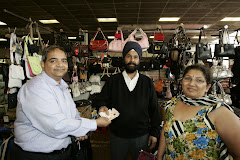Last week the Met Police carried out pre-dawn raids in Slough where they rescued children from a Romanian trafficking gang.
These children were trained to steal and beg.
Recently, police conducted several raids on homes in East London.
According to the Times, they burst into a small terraced house in Ilford (Redbridge) and found 27 Romanian Gypsies, 16 of whom were children, some as young as 4 months, from several families, sleeping in the bedrooms, lounge and even the kitchen.
No doubt, many issues will emerge from this raid: how big is the actual scale of the trafficking? Is it happening next door to me? Will these children ever be re-united with their families – do they want to be? etc.
It’s also possible that people in East London, like other parts the country, may stereotype Romanians and other Eastern Europeans as smugglers, thieves and beggars.
The Romanian Cultural Institute says that they are perceived negatively – think orphaned-children, stray dogs and too-eager migrants – and less for their arts & heritage highlights.
There are many Romanians and Eastern Europeans living in East London.
Most of them work hard and live peacefully; they should not be painted with the same brush as their countrymen involved in the Slough raid.
What will it take to change society’s negative perception of Romanians?
Monday 28 January 2008
Child slaves raid and the perception of Eastern Europeans
Tuesday 22 January 2008
Local leaders map out Olympics legacy

Plans have been drawn up to make sure that we don't lose out after the 2012 Olympics Games.
We know millions - and the figure is growing taller - will be put into the Games.
Leaders from the five London host boroughs of Greenwich, Hackney, Newham, Tower Hamlets and Waltham Forest have asked the government for a firm financial commitment to ensure that the Olympic Park venues (pictured) are viable after the Games.
They also asked for funding to meet the extra demands that the Games will put on council services.
Already some of these boroughs are battling to provide basic council services and it’s easy to see why it baffles councillors as to how they’ll cope during and after the games.
They presented their concerns to the Government Select Committee on
preparations for the Olympic and Paralympic Games in 2012 last week.
The host group say they are pushing for local people to have a say in the long term future of the London 2012 Games.
And talking of what people are saying about the Games, the
London Paper says there’s controversy over plans to remove eight statues (including one of Sir Winston Churchill) to create a pedestrianised piazza in time for the Olympics.
Apparently the plans by Swiss designers, Vogt Landscape Architects, have not gone well with English Heritage, which insists that the statues must not be moved.
Monday 14 January 2008
The trials of bus journeys in these ends

A friend has just told me she feels very safe on London buses because they have cameras.
People like her are getting harder to find.
Notwithstanding the increase in the number of CCTV cameras that Transport for London has placed on buses, a London Assembly report released on Friday says the rate of crime remains higher than two years ago and passengers feel less safe on buses than on other mode of public transport.
Transport for London has slammed this report as miselading.
One of the main bus routes in East London is the bus 25, running from Oxford Circus to Ilford.
It is also one of the most notorious routes in London: from 2003 – 2006 it generated the highest numbers of bus crime reports.
Other main routes in the East End i.e. the 8 and 86 also feature on the list.
I’ve witnessed some criminal fights on the 25, and some nasty incidents.
More recently, an elderly man was amlost badly beaten by a youth who happened to be sitting next to me.
Out of nowhere, the youth began swearing the man and shouting stuff like: ‘You’re a Polish immigrant! Get out of our country …’
The old man tried, in the best English he could muster, to indicate that he was sorry for ‘offending’ the youth and begged to be left alone.
This was not enough for the youth, who got even more aggressive. He stood on the seat and pointed to his ankle:
‘Do you see what’s on my ankle?’ he shouted proudly, ‘It’s a mark that says “East London!”’
As he smoked his cigarette, he continued swearing and then ordered the old man to get off and have a ‘proper’ fight with him.
As the old man quietly digestested this drama, the youth suddenly spat at him.
All the while the bus was moving and, of course, the cameras were rolling.
Monday 7 January 2008
This could be the year for small voices

As thousands of people geared to celebrate the new year, a small group of traders at Queens Market in Newham met to demonstrate against plans to demolish the place and put up flats and a new market.
Called Friends of Queens Market, the group says Newhams Council’s plans will hit poor and ethnic people most.
Newham Council says a new Equality Impact Assessment will be undertaken in the future.
The traders are quite brave to challenge big development plans in a borough buzzing with regeneration, possibly for the sake of the 2012 Olympics.
Already leisure centres are being revamped and a zero carbon residential scheme has been launched in the Royal Docks.
As we enter 2008, there are broader challenges facing most boroughs in East London such as unemployment, crime and housing.
Will those in authority listen to a group of market traders who are challenging big plans? There’s a chance they will.
In 2007 disadvangted people that were ignored in the past were heard – and even helped.
For example, last month the government announced a programme to boost the number of role models for young black men. The move is an outcome of a REACH report which states that often, their role models are rap stars who glamorise guns.
Also, the London Development Authority deceided to fund a development scheme for hundreds of blind and partially visually impaired people to get help start and sustain a business.
The friends of Queens Market have been campaigning for a while now, and I’d like to believe 2008 will be the year things change for the traders and the many struggling voices in East London.

